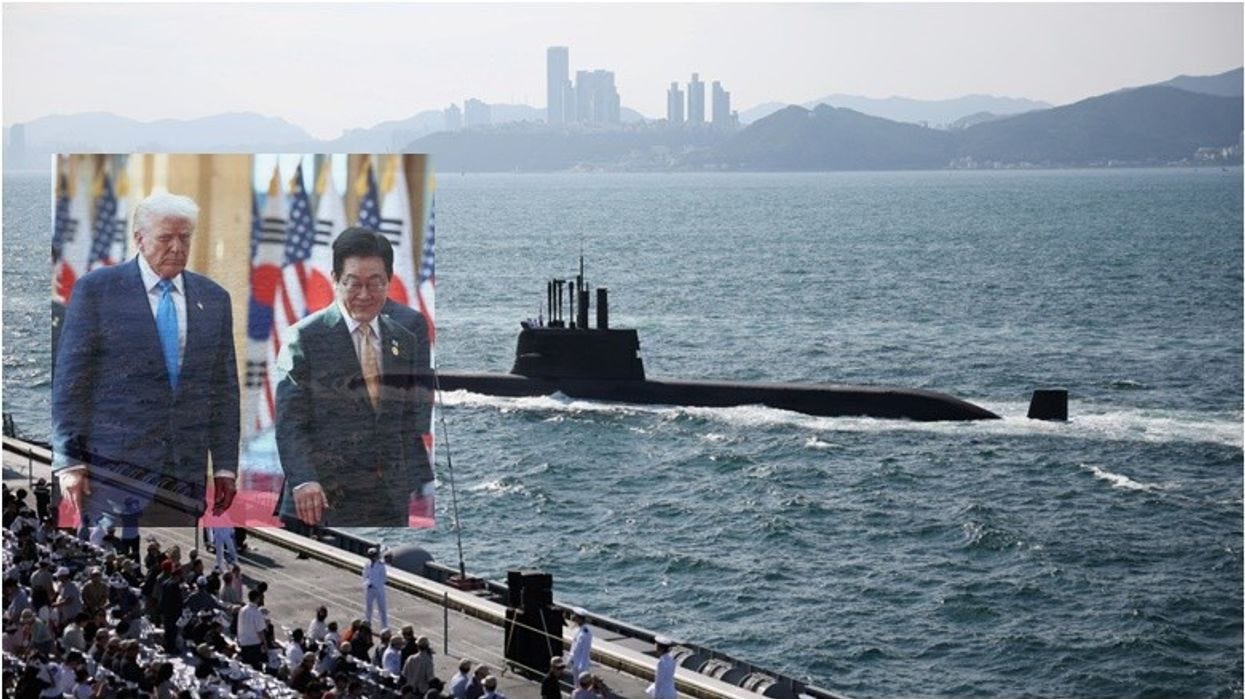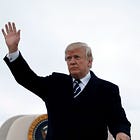Trump's Extraordinary Nuclear Submarine Deal With South Korea
Fresh off his reaffirmation of the AUKUS deal, President Trump agrees to supply nuclear subs to a second key ally. But this time, the agreement greatly increases America's shipbuilding capacity.
NOTE: Two weeks ago, Donald Trump and Australian Prime Minister Anthony Albanese reaffirmed the AUKUS deal to provide Australia with nuclear Virginia-class attack submarines. This came after a lengthy review by the War Department, prompted by (very real) concerns about America’s ability to produce the needed subs.
Needless to say, in an environment of such concern, few saw a deal to similarly equip South Korea coming. But it has. And it’s brilliant.
An essential part of Donald Trump’s foreign policy is to stand up allies as true partners, not dependents. This is exactly why he’s pushed them to meet and expand their defense spending commitments as well as their domestic defense industries (not neglecting to buy arms from U.S., of course).
Net effect? The U.S. will still possess the world’s largest, most powerful military. But key allied forces will be meaningful adjuncts to it, a foreign “National Guard” if you will, to be called up in time of mutual need. A strengthened German or Polish Army greatly reduces European dependence on U.S. power, especially in times when America might be engaged elsewhere. Likewise, a resurgent Japanese Navy creates meaningful problems for any potential Chinese threat, especially an invasion of Taiwan, and does so long before U.S. forces could reasonably be expected to arrive on the scene.
Now, in furtherance of that strategy, Australia and South Korea will simultaneously join one of the world’s most exclusive clubs. Only the U.S., UK, France, Russia, China, and India have nuclear-powered submarines, all developed indigenously. No one has ever sold a nuclear submarine to another country, though Russia has jointly operated three with India. In this, as in so many things, Trump is breaking very new ground.
The plan is a part of South Korea’s just-announced $350 billion investment in the U.S., a significant portion of which will be going to the Philadelphia shipyard where South Korea’s new boat will be built. This helps solve the capacity problem AUKUS has faced. Only the shipyards at Groton and Newport News can currently build nuclear submarines. South Korea’s investment instantly increases U.S. capacity by 50%.
That means the U.S. Navy can rebuild its own fleet, while also supplying Australia. Greater utilization will encourage further investment. And crucially, South Korea will provide advanced shipbuilding know-how that has increasingly atrophied in the U.S. due to defense cutbacks and the ever-awful Jones Act.
The Rod Martin Report strongly endorses both AUKUS and the new deal with South Korea. Indeed, it is time to consider similar deals with Japan, and possibly Taiwan. If the forces arrayed against it are sufficiently strong, China may choose never go to war. The alliance’s collective investment in peace could well save millions of lives.
As to South Korea, it is no longer merely buying American security: it is building interdependence and becoming a first-rank military power in its own right. Seong-Hyon Lee elaborates below. — RDM
Trump’s Extraordinary Nuclear Submarine Deal With South Korea
by Seong-Hyon Lee
November 6, 2025
The dust from the APEC summit in the South Korean city of Gyeongju has settled, and the commentariat has, perhaps understandably, focused on the tactical U.S.–China truce. But the real, lasting tectonic shift of the week was not the temporary ceasefire between Donald Trump and Xi Jinping. It was the permanent, structural deal struck between Trump and South Korean President Lee Jae-Myung.
President Donald Trump’s declaration that he had given South Korea a green light to build a nuclear-powered submarine (SSN) was a geopolitical earthquake. It marks a departure from seven decades of U.S. non-proliferation doctrine and appears to elevate South Korea into the most exclusive tier of U.S. allies — a group previously limited to the United Kingdom and, more recently, Australia.
Scepticism, as captured in South Korea’s Yonhap News analysis, was immediate and understandable. How can such a deal be genuine or sustainable? Trump’s foreign policy style has often been described as transactional and unilateralist. The U.S. Congress has not voted on this matter. Future administrations could reverse course. And, most critically, the AUKUS pact to provide Australia with SSNs has already faced delays, constrained by a U.S. industrial base that cannot even meet its own navy’s quota of two Virginia-class submarines per year.
Why, the sceptics ask, would the Korean case be any different?
This line of questioning is logical — but it overlooks the stark reality of the new arrangement. The sceptics are asking the wrong question. They ask: Will the United States keep its promise? They should be asking: Have Lee and Trump engineered a situation in which a future U.S. Administration cannot afford to break its promise?
The answer appears to be yes.
This agreement is not a promise built on the shifting sands of political trust. It is a structural transaction anchored in steel, jobs, and mutual industrial dependency. South Korea — long the junior partner in the alliance — has just executed one of the most sophisticated strategic-industrial plays in modern history. In the process, in Trumpian fashion, it is becoming a true partner, not a dependent.
The Myth of the Gift
First, we must discard the notion that this was a gift. Lee did not approach Trump as a supplicant; he approached him as a buyer. He understood the transactional nature of contemporary U.S. diplomacy — that “America First” translates into allies shouldering greater responsibility — and he embraced the opportunity that presents.
The price was the $350 billion investment package. But this is not a simple transfer of funds; it is a long-term industrial merger.







